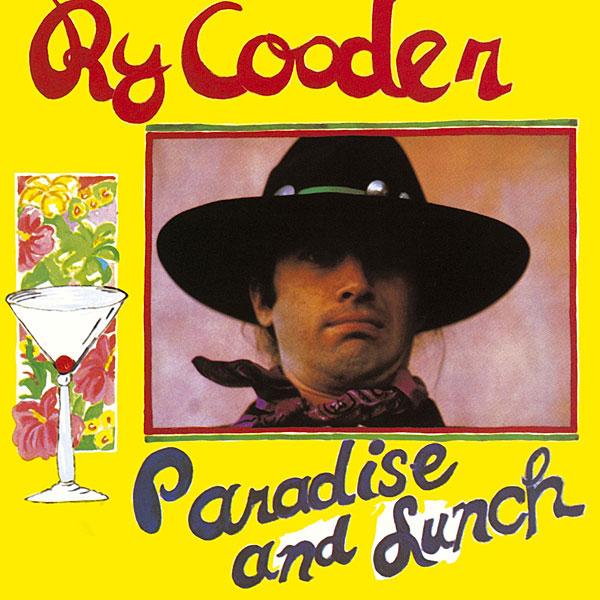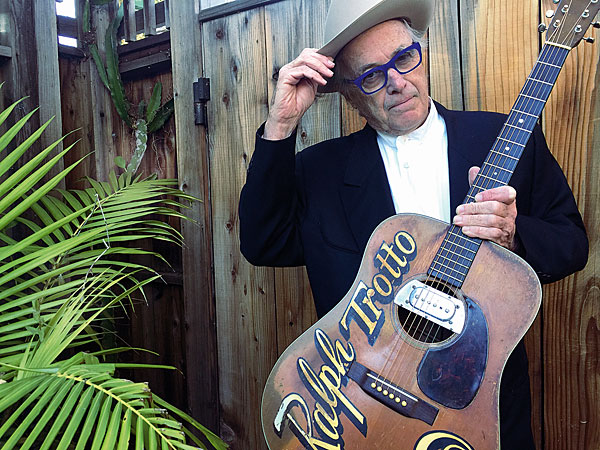Ry Cooder: Paradise And Lunch

Rated among the finest of Cooder's 17 solo albums, Paradise And Lunch, his fourth release, is easily deserving of Vinyl Icon status.
Ryland Peter Cooder first achieved wide recognition as an in-demand axe-slinger who worked with The Rolling Stones, Little Feat, Van Morrison and countless other artists. But to think of him simply as a superbly tasteful guitarist does not do him full justice.
He's not a great songwriter, or a fantastic vocalist, but from the outset of his career he demonstrated an uncanny knack for unearthing relatively obscure songs that were not only unjustly overlooked gems, but were also ideal for him to perform.
Gorgeous Gospel
From 1974, Paradise And Lunch amply demonstrates all of his gifts from the opening twangs of the first track, the traditional work song 'Tamp 'Em Up Solid'. Cooder sets it to a lively shuffle beat, and colours it with gorgeous gospel-like male backing vocals, while his guitar sparkles and dances throughout. It's hardly an earth-shatteringly original arrangement, but Cooder and his crew deliver exactly what it needs.
'That's an old railroad song I heard from Josh White', he has explained. 'One of the gospel singers on the record, Bill Johnson, knew it.
![]()
I wondered how we ought to do it, so he just said, "You do it like this, then you play this, so and so sings that, and that's how it's done".
'All of a sudden you find you're learning a whole great big thing about arrangements which stays with you, although it doesn't happen very often.' As with all Cooder albums, Paradise And Lunch is about a well-ordered sequence of perfectly arranged performances rather than overwrought emotional impact, high-end production or gasp-inducing instrumental virtuosity.
Shimmering Guitar
The 1929 composition 'You Can't Stop A Tattler' by the Texan gospel-blues performer Washington Phillips And His Manzarene Dreams is next up for transformation. Cooder takes what was a simple moral tale accompanied by nothing more than a lightly plucked zither and elevates it to another realm with yet more gospel vocals, a deliciously understated Nick De Caro string arrangement, and his own shimmering guitar lines.

Cooder has always employed unusual tunings in his arrangements, and 'The Tattler' is one of the finest examples of this. 'The overall sound of "The Tattler",' Cooder told Guitar Player magazine in 1980, 'is strictly on account of playing D position in G tuning. You just can't get those passing chords in standard, and you can't get the bass notes.'
Cooder takes a rare co-writing credit on this song, because, 'There were a lot of verses I didn't include, church verses about people who go to church on Sunday, raise hell on Monday. People who don't put any money in the collection box. People making dates with their neighbour's wife in church'. Feeling that such preachy lyrics wouldn't work for a hip 1970s audience, Cooder simply went and left them out.
His rearrangement resulted in a song that was certainly more accessible to contemporary listeners, as was confirmed when Linda Ronstadt covered Cooder's arrangement on her 1976 Grammy-winning album Hasten Down The Wind.
'I figured somebody would cut that song,' Cooder later revealed. 'I didn't know who but I think it's nice that she did. I certainly appreciate it. I'll make some money.' Even by this point in his acclaimed career, Cooder's albums weren't big sellers, so extra cash was always welcome.
















































